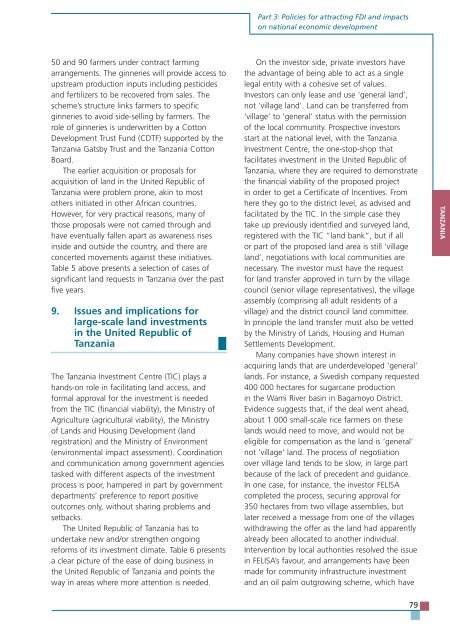TRENDS AND IMPACTS OF FOREIGN INVESTMENT IN DEVELOPING COUNTRY AGRICULTURE
TRENDS AND IMPACTS OF FOREIGN INVESTMENT IN DEVELOPING COUNTRY AGRICULTURE
TRENDS AND IMPACTS OF FOREIGN INVESTMENT IN DEVELOPING COUNTRY AGRICULTURE
You also want an ePaper? Increase the reach of your titles
YUMPU automatically turns print PDFs into web optimized ePapers that Google loves.
50 and 90 farmers under contract farming<br />
arrangements. The ginneries will provide access to<br />
upstream production inputs including pesticides<br />
and fertilizers to be recovered from sales. The<br />
scheme’s structure links farmers to specific<br />
ginneries to avoid side-selling by farmers. The<br />
role of ginneries is underwritten by a Cotton<br />
Development Trust Fund (CDTF) supported by the<br />
Tanzania Gatsby Trust and the Tanzania Cotton<br />
Board.<br />
The earlier acquisition or proposals for<br />
acquisition of land in the United Republic of<br />
Tanzania were problem prone, akin to most<br />
others initiated in other African countries.<br />
However, for very practical reasons, many of<br />
those proposals were not carried through and<br />
have eventually fallen apart as awareness rises<br />
inside and outside the country, and there are<br />
concerted movements against these initiatives.<br />
Table 5 above presents a selection of cases of<br />
significant land requests in Tanzania over the past<br />
five years.<br />
9. Issues and implications for<br />
large-scale land investments<br />
in the United Republic of<br />
Tanzania <br />
The Tanzania Investment Centre (TIC) plays a<br />
hands-on role in facilitating land access, and<br />
formal approval for the investment is needed<br />
from the TIC (financial viability), the Ministry of<br />
Agriculture (agricultural viability), the Ministry<br />
of Lands and Housing Development (land<br />
registration) and the Ministry of Environment<br />
(environmental impact assessment). Coordination<br />
and communication among government agencies<br />
tasked with different aspects of the investment<br />
process is poor, hampered in part by government<br />
departments’ preference to report positive<br />
outcomes only, without sharing problems and<br />
setbacks.<br />
The United Republic of Tanzania has to<br />
undertake new and/or strengthen ongoing<br />
reforms of its investment climate. Table 6 presents<br />
a clear picture of the ease of doing business in<br />
the United Republic of Tanzania and points the<br />
way in areas where more attention is needed.<br />
Part 3: Policies for attracting FDI and impacts<br />
on national economic development<br />
On the investor side, private investors have<br />
the advantage of being able to act as a single<br />
legal entity with a cohesive set of values.<br />
Investors can only lease and use ‘general land’,<br />
not ‘village land’. Land can be transferred from<br />
‘village’ to ‘general’ status with the permission<br />
of the local community. Prospective investors<br />
start at the national level, with the Tanzania<br />
Investment Centre, the one-stop-shop that<br />
facilitates investment in the United Republic of<br />
Tanzania, where they are required to demonstrate<br />
the financial viability of the proposed project<br />
in order to get a Certificate of Incentives. From<br />
here they go to the district level, as advised and<br />
facilitated by the TIC. In the simple case they<br />
take up previously identified and surveyed land,<br />
registered with the TIC “land bank”, but if all<br />
or part of the proposed land area is still ‘village<br />
land’, negotiations with local communities are<br />
necessary. The investor must have the request<br />
for land transfer approved in turn by the village<br />
council (senior village representatives), the village<br />
assembly (comprising all adult residents of a<br />
village) and the district council land committee.<br />
In principle the land transfer must also be vetted<br />
by the Ministry of Lands, Housing and Human<br />
Settlements Development.<br />
Many companies have shown interest in<br />
acquiring lands that are underdeveloped ‘general’<br />
lands. For instance, a Swedish company requested<br />
400 000 hectares for sugarcane production<br />
in the Wami River basin in Bagamoyo District.<br />
Evidence suggests that, if the deal went ahead,<br />
about 1 000 small-scale rice farmers on these<br />
lands would need to move, and would not be<br />
eligible for compensation as the land is ‘general’<br />
not ‘village’ land. The process of negotiation<br />
over village land tends to be slow, in large part<br />
because of the lack of precedent and guidance.<br />
In one case, for instance, the investor FELISA<br />
completed the process, securing approval for<br />
350 hectares from two village assemblies, but<br />
later received a message from one of the villages<br />
withdrawing the offer as the land had apparently<br />
already been allocated to another individual.<br />
Intervention by local authorities resolved the issue<br />
in FELISA’s favour, and arrangements have been<br />
made for community infrastructure investment<br />
and an oil palm outgrowing scheme, which have<br />
79<br />
TANZANIA


